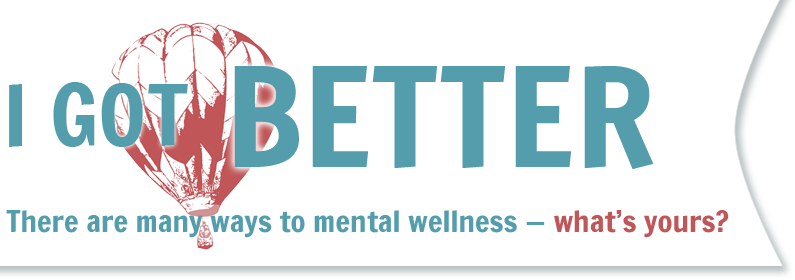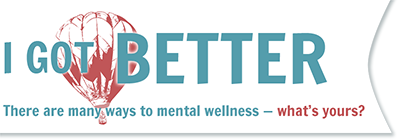Much Better and Faster at Getting Through It
Irit Shimrat; Vancouver, British Columbia

If you have ever received a hopeless message that your recovery from a mental health or emotional problem was unlikely, what was the source of that message?
Mental health service providers, and the media.
Has a mental health provider ever told you that you could not reach a personal goal because of your psychiatric diagnosis (for example, education, career, independent housing, relationship, children, etc.)?
None of the mental health f@#$% – oopsie! I mean service providers! – ever discussed this or anything else with me, other than meds and “symptoms.”
If you overcame hopelessness that you could get better from a mental health or emotional problem, was there a turning point for you? Please describe:
It began with getting together with my (at that time) lesbian lover (the late, great) Chris Bearchell, thus taking up homosexuality (temporarily, alas) as an antidote to feeling terminally sorry for myself as the result of being psychiatrized.
Then came activism, first in the gay liberation movement and then in antipsychiatry: editing Phoenix Rising magazine; co-founding the Ontario Psychiatric Survivors’ Alliance; working (in small ways) in radio, film and TV; speaking at conferences, writing my book, and through all this meeting more and more wonderful survivors of psychiatric treatment.
… What has helped me is co-founding, organizing, running and participating in projects, organizations and events run of/for people who have survived psychiatric treatment (not “consumers” or “users” – yuck!) and I don’t really like to classify important friendships with other crazy people as “peer support”!
Tell us what recovery means to you. How would you define recovery from mental health or emotional problems in your own words?
I wouldn’t. I think it’s grotesque to continue to use the illness paradigm in this way. I’m okay with recovery from psychiatrization. Also with figuring out how to channel craziness so that it does good rather than harm.
However, for the purposes of your basically excellent survey I am going to answer “yes” to the following question [have you experienced at least some recovery from a mental health or emotional problem?].
And certainly I have at times been nuts and then stopped being nuts, and have been enraged and then stopped being enraged, and have been miserable have then stopped being miserable. Also… I consider myself fully recovered from the damage done me by the psychiatric industry, but I do still get crazy, enraged or miserable now and again. However, I’m much better and faster at getting through it, getting over it, and moving on.
What are some ways that you maintain your recovery from a mental health or emotional problem?
I do not think of yoga and tai chi as religious or spiritual practices, but rather as physical disciplines with emotional dividends; they do me good.
Equally important are …writing, reading, watching movies, singing, playing and listening to music, dancing, swimming, bike riding, occasional use of various recreational drugs and lots of other things, many of them having to do with nature/the great outdoors (though not, in my case, gardening) have helped me recover from psychiatry and enjoy my life.
If you could send a brief message to someone receiving mental health care today who is feeling hopeless about getting better, what would you say?
Many of us who have been through what you’re going through are okay now, and some of us are even better than okay.


